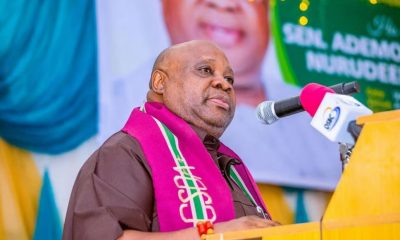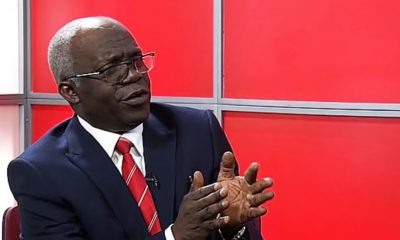Business
Diaspora remittances: Nigeria’s economic lifeline?
Published
2 years agoon
By
Publisher
By Marcel Okeke
One of the ironies of the Nigerian economy remains the fact that at a time that it is expected to be reaping a ‘sustained windfall’ from high oil prices in the international market, the country has rather been experiencing diminishing (foreign exchange) inflow from oil sales. The price of crude oil for close to one year (since the onset of the Russia-Ukraine war in February 2022) has remained averagely above US100 dollars per barrel. More than ever before, however, in the past couple of years, the country has been going through unprecedented forex crunch (external reserves decline) and virtual drying up of all foreign exchange inflow owing, in part, to Nigeria’s continued inability to meet up its Organization of Petroleum Exporting countries (OPEC) allocated oil production/sales quota. The bizarre phenomenon of oil theft; vandalism on critical oil infrastructure as well as massive willful sabotage of facilities—all have combined to consistently weaken the oil production/supply capacity of the country. While Nigeria’s OPEC quota is almost two million barrels per day, the country for the better part of 2022 produced less than a million barrels per day.
In the face of all these—even when the country is already finding it difficult to borrow from abroad via bond issuance—remittances from the Diaspora appear to be offering some sort of lifeline as regards forex inflow. According to the World Bank Migration and Development Brief (MDB), remittance inflow into Nigeria in 2022 is estimated at US$20.9 billion; an increase of about 7.5 per cent from US$19.5 billion inflow recorded in 2021. Remittance flows, according to the World Bank document, are expected to globally reach US$794 billion in 2022. However, in Sub-Saharan Africa, remittances are expected to slow to 5.2 per cent in 2022, compared to 16.4 per cent growth recorded in 2021.
Surprisingly, however, Nigeria maintains the lead in Sub-Saharan Africa. Thus, according to the World Bank, “Nigeria retained its position as the highest recipient of remittances in Sub-Saharan Africa during 2022, followed by Ghana, Kenya, and Senegal. Also, Nigeria is included among the top ten recipients of remittances globally.” Still heartening is that Nigeria is expected to maintain strong remittance flows in 2023. However, according to the Word Bank, remittances to Sub-Saharan Africa in 2023 are projected to soften to 3.9 per cent growth “as adverse conditions in the global environment and regional source countries persist.” But, for Nigeria, the Word Bank says the sustenance of the “Naira for Dollar” scheme is expected to support diaspora remittance inflow, adding that “the launch of the e-Naira, Nigeria’s digital currency, could also help migrants and remittance service providers have easy access to bank accounts.”
These cheery performances of Nigeria and outlook for improved diaspora remittances totally agree with the outcome of a study by PriceWaterhouseCoopers (PwC) in August 2022. Tagged: “Nigeria Brain Exports: The Optimal Path to Growing the Nigerian Economy”, the study adopts the concept of ‘Global Value Chain (GVC)’—saying “we recommend placing Nigerians in high-end GVCs.” The study says that given “Nigeria’s unique assets and attributes…the best development path should be where Nigeria exports Brain Capital into higher value-added global services markets.” Further buttressing this possible gain, the PwC report posits that: “Nigeria has a significant Brain Capital advantage with a large youthful population of an average age of 19 years. Considering the ageing population in countries such as Germany, Japan, Italy and United States, it is estimated that the world-wide working age population will see a ten per cent decline by 2060. Japan in particular tops this list with 28 per cent of its population above 65 per cent and Italy comes second with 23 per cent. In contrast, only 2.7 per cent of Nigerian population is above 65 per cent; which means Nigeria is strategically positioned to supply labor to the global market, a strong comparative advantage.”
Noting that global service delivery by Nigerians has already started, the PwC study said “Nigeria has shown, across several service sectors, including entertainment, sports and music that it has talent that can compete and win opportunities in the global market. Earnings of Nigerians who have tapped into GVCs significantly outclass their counterparts who may be considered equally capable but who operate only in the Nigerian market.” The study named many Nigerians who are players with reputable football clubs, for instance, across the globe and the huge sums they’re paid in hard currencies—and from which they remit substantial part (home) to Nigeria.
In a section it called ‘Looking Beyond Oil’, the PwC study says “the most pressing reason for diversification (of the Nigeria economy) is that Nigeria’s oil production per capita is insufficient to launch its citizens into prosperity. The 2020 average daily production value of 1.8 million barrels of crude oil means the country averages about 3.3 barrels per Nigerian per year before equity cuts (Nigeria does not own 100 per cent of its oil ventures). The delayed reform of Nigeria’s Petroleum Industry, as seen in the Petroleum Industry Bill (PIB), has also prevented massive amounts of investment which could have unlocked significant value.” The study noted besides that “oil does not solve the unemployment problem of the country as the oil and gas sector accounts for less than one per cent of total employment in Nigeria.”
In another study in 2019 by PwC titled ‘Strength from abroad: The economic power of Nigeria’s diaspora’, it was revealed that Nigeria was already harnessing the potential of Brain Capital through foreign remittances. According to the International Monetary Fund (IMF), remittances represent household income from foreign economies arising mainly from people’s temporary or permanent movement to those economies. Remittances include cash and non-cash items that flow through formal channels such as electronic wire, or through informal channels such as money or goods carried across borders. Making a case for effective harnessing of Nigeria’s diaspora remittances, the PwC compared the contribution of oil sales (income, net of cost) and total remittances to the economy over some years. While oil revenue was USD 5.97 billion, USD 2.12 billion and USD 7.19 billion in 2019; 2020 and 2021 respectively, remittances on the other hand totaled USD 23.8 billion; USD 17.2 billion and USD 21 billion respectively in those years.
In sum, the PwC says, “When we look at the net oil performance side by side with remittances, we can see more clearly that Nigerian brains working in the diaspora contribute more to the economy than oil. In addition to the trends reshaping the global human capital value chain, Nigerians have shown they can consistently generate significant cash flow from foreign economies. Nigeria can continue to grow its forex cash flow by inserting more citizens into GVCs.”
- Okeke, an economist, sustainability expert and consultant on business strategy, is a National Daily Analyst. He can be reached at: [email protected]
You may like


Ogun multiple road crashes claim six lives


Katsina: Police confirm rescue of 30 abducted children


Gov. Yusuf distributes palliatives to hospital patients in Kano State


Police clarify report on Primeboy’s re-arrest


Osun govt addresses possibility of lifting curfew on Ifon, Ilobu communities


Sanction Senegalese President for postponing election — Falana to ECOWAS
Trending

 Comments and Issues2 days ago
Comments and Issues2 days agoAs Ariwoola takes the judiciary to the top of the grease pole

 Business6 days ago
Business6 days agoNMDPRA Chief faces backlash over comment on Dangote Refinery

 Business1 week ago
Business1 week agoGlobal cyber outage disrupts flights, Banks, telecoms, Media

 Business1 week ago
Business1 week agoKPMG criticizes FG’s 50% windfall tax, foresees legal disputes

 Business5 days ago
Business5 days agoZenith Bank retains position as Nigeria’s Tier-1 capital leader

 News6 days ago
News6 days agoPhilip Shaibu officially joins APC, dumps PDP

 Comments and Issues5 days ago
Comments and Issues5 days agoOnanuga and the Surprise from Joe Igbokwe

 Education7 days ago
Education7 days agoJAMB reacts to allege age limit by ministry of education



